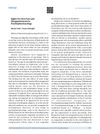 59 citations,
March 2020 in “Journal of Biomedical Science”
59 citations,
March 2020 in “Journal of Biomedical Science” Understanding how hair follicle stem cells work can help find new ways to prevent hair loss and promote hair growth.
 56 citations,
January 2021 in “Clinical and Experimental Medicine”
56 citations,
January 2021 in “Clinical and Experimental Medicine” The document concludes that while there are various treatments for Alopecia Areata, there is no cure, and individualized treatment plans are essential due to varying effectiveness.
 53 citations,
May 1987 in “The Lancet”
53 citations,
May 1987 in “The Lancet” The document suggests a possible link between Crohn's disease and Johne's disease and calls for more research.
 36 citations,
May 2011 in “Dermatologic therapy”
36 citations,
May 2011 in “Dermatologic therapy” No treatments fully cure or prevent alopecia areata; some help but have side effects or need more research.
 36 citations,
January 2010 in “Human & experimental toxicology”
36 citations,
January 2010 in “Human & experimental toxicology” Eating paradise nuts led to selenium poisoning, causing nausea, hair loss, and other symptoms in two women.
 32 citations,
January 2018 in “American Journal of Clinical Dermatology”
32 citations,
January 2018 in “American Journal of Clinical Dermatology” Hormone therapy affects hair growth in transgender individuals, with testosterone potentially causing hair loss in trans men and estrogen reducing facial/body hair in trans women; treatment options vary.
 28 citations,
November 2020 in “Journal of Controlled Release”
28 citations,
November 2020 in “Journal of Controlled Release” A new hair loss treatment uses tiny needles to deliver a drug-loaded lipid carrier, promoting hair growth more effectively than current treatments.
 26 citations,
January 2019 in “Expert Opinion on Investigational Drugs”
26 citations,
January 2019 in “Expert Opinion on Investigational Drugs” New treatments for hair loss show promise, but more research is needed to confirm their safety and effectiveness.
 7 citations,
May 2014 in “Clinical practice”
7 citations,
May 2014 in “Clinical practice” Cooling the scalp may prevent hair loss from chemotherapy, hair often grows back after treatment, and nail issues usually improve after stopping the drug.
 4 citations,
December 2014 in “European Journal of Chemistry”
4 citations,
December 2014 in “European Journal of Chemistry” Iron chloride helps create compounds that could be useful in medicine, like treating hair loss.
3 citations,
May 2020 in “Journal of The Korean Medical Association” Minoxidil and finasteride are effective for treating hair loss, with dutasteride showing potential but with side effects.
 3 citations,
May 2018 in “InTech eBooks”
3 citations,
May 2018 in “InTech eBooks” Animal models, especially mice, are essential for advancing hair loss research and treatment.
 3 citations,
June 2014 in “Klinik Psikofarmakoloji Bulteni-bulletin of Clinical Psychopharmacology”
3 citations,
June 2014 in “Klinik Psikofarmakoloji Bulteni-bulletin of Clinical Psychopharmacology” The document concludes that there is hope for future psychopharmacology research despite challenges in treating schizophrenia.
 1 citations,
October 2023 in “International journal of Ayurveda and pharma research”
1 citations,
October 2023 in “International journal of Ayurveda and pharma research” Herbal medications might be safer and more effective for hair loss than synthetic treatments.
 1 citations,
October 1974 in “Postgraduate medicine”
1 citations,
October 1974 in “Postgraduate medicine” New drugs like clonidine and prazosin show promise for treating high blood pressure despite some side effects.

Sinsun-yukza-hwan extract promotes hair growth in mice.
 January 2016 in “Springer eBooks”
January 2016 in “Springer eBooks” The document concludes that there are various causes and treatments for hair loss, with hair transplantation being a notable option.
 June 2012 in “Springer eBooks”
June 2012 in “Springer eBooks” Eating disorders can cause various hair problems, and while hair loss in these disorders is linked to metabolic syndrome, treatment focuses on specific medications and lifestyle changes for the syndrome.
 January 1991 in “Journal of Pediatric Health Care”
January 1991 in “Journal of Pediatric Health Care” Hair loss in children can be caused by fungal infections, trauma, autoimmune disorders, or stress, and treatments vary depending on the cause.
 July 2018 in “Elsevier eBooks”
July 2018 in “Elsevier eBooks” Telogen Effluvium is a common, usually reversible hair loss condition, often improved by removing the trigger and possibly treated with various products, though their effectiveness is uncertain.
 December 2020 in “Journal of Aesthetic Nursing”
December 2020 in “Journal of Aesthetic Nursing” Injecting platelet-rich plasma into the scalp stimulates hair growth, increases hair density, and treats hair loss effectively with minimal side effects.
 December 2020 in “Skin appendage disorders”
December 2020 in “Skin appendage disorders” Finasteride may effectively treat hair loss in Klinefelter Syndrome patients.
 12 citations,
February 2012 in “New England journal of medicine/The New England journal of medicine”
12 citations,
February 2012 in “New England journal of medicine/The New England journal of medicine” A 72-year-old man had severe fatigue, weight loss, and frequent loose stools.
 July 2024 in “Medical Science Monitor”
July 2024 in “Medical Science Monitor” Women with type D personality and PCOS experience more stress and use less effective coping strategies.
 3 citations,
August 2022 in “Curēus”
3 citations,
August 2022 in “Curēus” The SARS-CoV-2 vaccine may be linked to triggering autoimmune conditions like Alopecia Areata.
 3 citations,
October 2003 in “Annals of Oncology”
3 citations,
October 2003 in “Annals of Oncology” A woman with low thyroid function did not lose her hair during chemotherapy, possibly because her hair follicles were less affected by the treatment.
 2 citations,
September 2021 in “JAAD case reports”
2 citations,
September 2021 in “JAAD case reports” Dupilumab helped a woman with severe hair loss regrow her hair quickly and maintain it for six months after stopping treatment.
 November 1998 in “Journal of The European Academy of Dermatology and Venereology”
November 1998 in “Journal of The European Academy of Dermatology and Venereology” A man's skin cancer improved and some of his hair grew back after treatment with a special light therapy and a medication.
 5 citations,
November 2016 in “Experimental and Therapeutic Medicine”
5 citations,
November 2016 in “Experimental and Therapeutic Medicine” BeauTop improves hair growth in androgenetic alopecia patients.
 5 citations,
June 2015 in “Journal of dermatology”
5 citations,
June 2015 in “Journal of dermatology” A woman and her daughter had thallium poisoning from a herbal drink and rodenticide, causing hair loss and other symptoms.




























